NUR-SULTAN – Kazakh Prime Minister Askar Mamin recently reviewed a few models of domestically produced electric vehicles, including electric busses, at the National Automobile Pavilion in Nur-Sultan.

The Kazakh government delegation reviewing localized Chinese electric vehicles in Nur-Sultan. Photo credit: primeminister.kz.
The prime minister reviewed electric crossovers of Chinese brands: the JAC (IEVS4, IEV7S), and NIO (ES6, ES8). The Association of the Kazakhstan AutoBusiness (AKAB) President Andrey Lavrentiev and JAC Deputy General Manager Yu Yang reported on the current state and development perspectives of environmentally-friendly cars for both domestic supply and export.
The 2021 goal is the production of 1,200 units of electric transports, including buses. In 2022, the national pavilion plans to increase production to 2,000 units.
As of today, Nur-Sultan has more than 50 charging stations for electric vehicles. Half of them are in special zones on the territory of the national pavilion.
Kazakhstan continues to improve infrastructure for electric vehicles, as well as introducing measures to make the use of green cars more appealing. The Almaty Green Economy Department, for example, has launched an online service that registers electric cars to allow passage through to the Medeu open-air ice skating rink to the Shymbulak ski resort, inform.kz reported.
Prior to this, electric car owners had to register manually by writing to the office of the Medeu rink. In 2016, the Almaty Akimat (city administration) restricted the entry of vehicles onto the Shymbulak tract to reduce the traffic load and anthropogenic impact on the environment.
The Kazakh auto industry demonstrated significant growth through the first half-year of 2020 despite the COVID-19 pandemic. The share of domestic cars reached 60 percent in the first six months.
The car industry in Kazakhstan continues to grow and receive investments thanks to the industry’s development prospects and the possibility of entering the 180-million people market of the Eurasian Economic Union.
